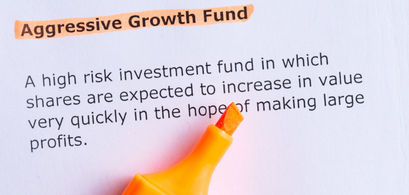Definition
The term aggressive growth fund refers to a portfolio of securities that attempts to maximize capital appreciation. There is a risk-reward trade off when investing in an aggressive growth fund; the greater returns associated with these funds means the investor is willing to accept more risk too.
Explanation
Also known as aggressive allocation and a capital appreciation fund, an aggressive growth fund is one that focuses on capital growth by investing primarily in equities. While most funds will typically include a mix of equities, bonds, and fixed income securities, an aggressive growth portfolio might have 70% to 90% of the fund's assets invested in equities. Generally, these funds fall into one of the following two investment types:
Aggressive Growth Hedge Funds: includes a management team that primarily focuses on equities expected to provide investors with above average earnings growth.
Aggressive Growth Mutual Funds: includes investments that attempt to maximize capital appreciation by focusing on companies expected to have high rates of growth.
There is a risk-reward trade off when investing in aggressive growth funds and individuals with low risk tolerance scores might want to avoid these types of investments. For example, the price volatility of these funds is much higher than less aggressive investments. These funds also tend to do better when an economy is growing. In the same way, these funds will provide relatively low returns when there is an economic downturn.
Related Terms



